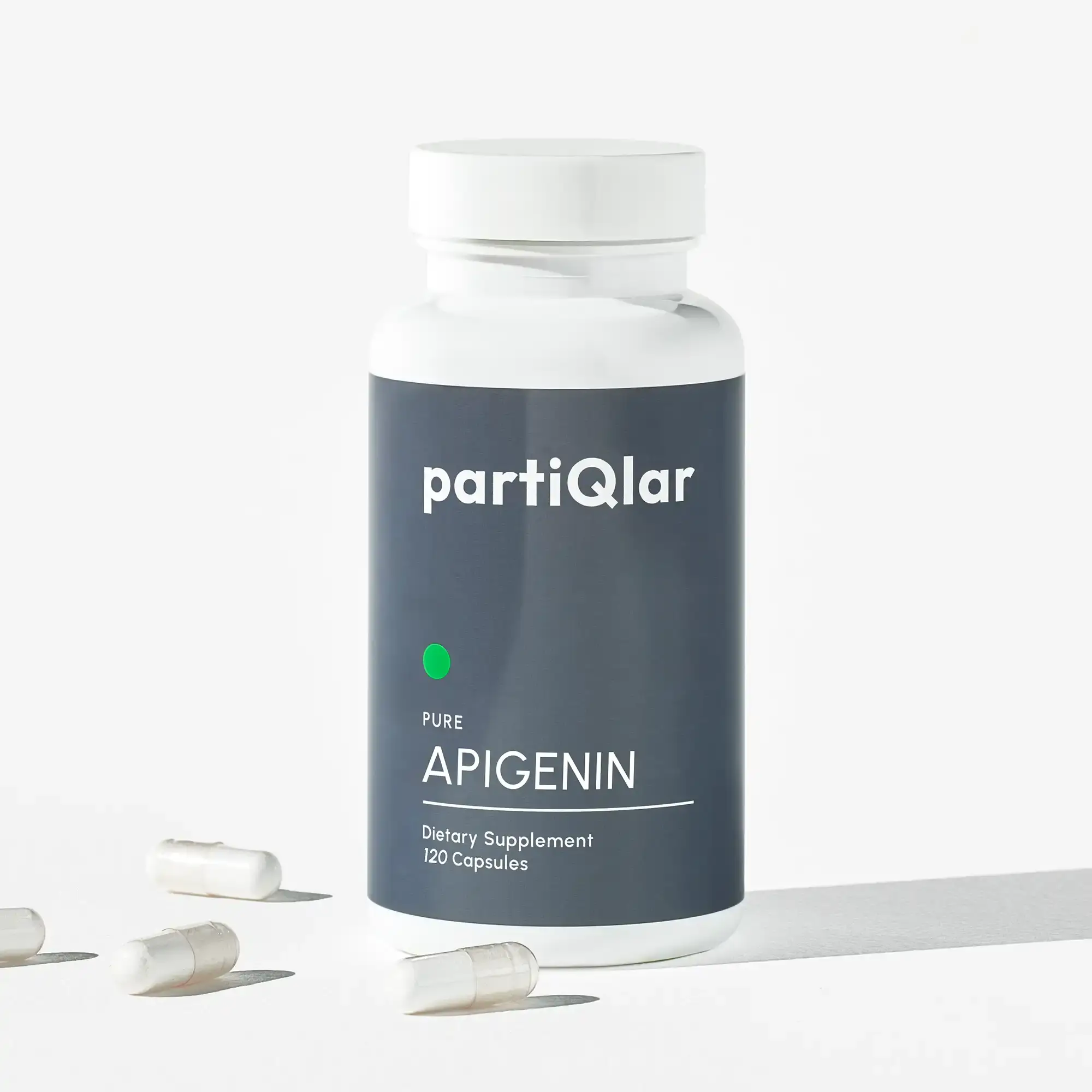Stress negatively impacts longevity, leading to various health issues. Learn effective methods to manage stress, such as exercise, relaxation techniques, and building strong social connections for a healthier life.
Apigenin: The Supplement for Better Sleep and Healthy Aging
- Lifestyle
- October 17, 2024
- Jan Vincent Beltran, PhD

Related Product
Explore how Apigenin can enhance sleep quality and promote healthy aging with its wide range of health benefits. Integrate Apigenin into your Sleep Cocktail to enjoy deeper, more restful sleep and support your overall well-being.
Apigenin: Better Sleep and Healthy Aging
If you struggle with insufficient sleep, frequently feel stressed or anxious, or have difficulty with focus and experience brain fog, it’s challenging to stay on track for healthy aging. These issues can significantly impact your overall well-being and daily functioning which may compromise your goal of aging gracefully.
As US statistics show, 1 in 3 adults are sleep deprived, around 19.1% or 40 million adults experience an anxiety disorder, and about 1 in 9 adults is affected by cognitive decline. Addressing these widespread health concerns is crucial for improving quality of life and promoting longevity.
So, if you are searching for a natural way to boost your health, improve sleep, and promote longevity, apigenin may be one of the top choices. Abundantly found in everyday foods, apigenin offers a remarkable range of health benefits and has a long history of safe use.
Here, we discuss the science behind apigenin, dive into its health benefits, and explore the studies that support its use as a key player in optimizing health and wellness.

What is Apigenin?
Apigenin is a naturally occurring flavonoid in various plants, such as parsley, celery, chamomile, and citrus. Structurally, apigenin is categorized as a glycoside which are molecules linked to sugar molecules. This bioactive compound is known for its antioxidant and anti-inflammatory properties and is commonly used for its sleep-promoting effects.
Apigenin has garnered significant attention within the scientific community due to its diverse pharmacological effects and other potential therapeutic applications. It is commonly included in a healthy lifestyle through foods containing apigenin or nutraceutical supplements to support overall well-being.
What are the benefits of taking Apigenin?
Many research studies support the versatile nutraceutical value of apigenin. As a flavonoid found in many plants, apigenin offers a range of potential health benefits thanks to its broad biological and pharmacological properties.
Here’s a breakdown of apigenin benefits:
Improves sleep
Many people struggle with sleep disturbances, and apigenin sleep supplements are on the top list of natural sleep aids on the market due to its sedative effects. In fact, chamomile tea, which is rich in apigenin, is largely marketed to promote better sleep. Experimental animal studies show that it may cause dose-dependent muscle relaxation and sedation and reduce sleep latency which overall facilitates a smoother transition to sleep.
Reduces Anxiety
Generally, apigenin may combat stress, anxiety, and depression—major sleep disruptors that negatively impact the quality of life in various aspects.
Apigenin may reduce stress, alleviate anxiety, and improve mood by influencing specific brain receptors, such as GABA receptors, which promote relaxation and calmness. Of course, the anti-inflammatory and antioxidant properties further offer neuroprotection from damage associated with chronic stress. Additionally, apigenin may help reduce stress hormones like cortisol, contributing to a calmer response to stressful situations. The Journal of Steroid Biochemistry and Molecular Biology previously reported up to 47.5% reduction of cortisol production in human adrenal cells when exposed to apigenin. Overall, apigenin’s calming and anxiolytic effects may help alleviate anxiety and promote a relaxed state of mind conducive to sleep and overall mental well-being.
Promotes Senolysis
Senolysis is the process of selective elimination of senescent cells—old, non-dividing cells that contribute to aging and age-related disorders by secreting toxic or harmful inflammatory factors. The elderly typically have accumulated senescent cells and clearing them via senolytic compounds like apigenin is beneficial for health and a range of diseases.
In a 2017 study conducted at the Buck Institute for Research on Aging, apigenin suppressed the senescent cells in human breast cancer cultured cells, reducing its aggressive phenotype. However, research on apigenin’s senolytic properties is still in its early stages and its impact on other aging-related diseases is currently being explored.
Supports heart health
With cardiovascular diseases being the leading cause of death globally, many become interested in heart-healthy habits and heart-protective supplements.
Apigenin may protect against heart diseases due to its ability to preserve the lining of coronary arteries and reduce the accumulation of lipids and cholesterols that result in plaque buildup. Additionally, a 2021 animal study further shows that apigenin may help against hypertension and cardiac hypertrophy.
Increases insulin secretion
In 2021, a total of 28.4 million people in the US had diabetes. Hyperglycemia or high blood sugar levels contribute to diabetes development. Often, it is triggered by impaired insulin production or when your cells don’t respond to the insulin produced, which results in uncontrolled, high sugar levels in the bloodstream.
An animal study from the Biomedicine & Pharmacotherapy journal revealed that apigenin can enhance insulin secretion. Further, recent data suggests apigenin may also possess anti-diabetic potential with its ability to improve blood sugar control in cells that became resistant to insulin. In effect, apigenin may help regulate blood glucose levels, which can potentially benefit individuals with pre-diabetes, diabetes, or insulin resistance.
Increases testosterone levels
In males, low testosterone levels can lead to reduced sex drive, depression, muscle loss, erectile dysfunction, shrinking testicles, and even infertility. Testosterone shortage is also linked to insomnia and shorter life in aging men. An animal study published in the Journal of Nutritional Biochemistry found that apigenin can significantly increase testosterone production.
How does Apigenin work?
Apigenin exerts its effects through multiple biochemical pathways. Within the body, its potential health benefits stem from its multifaceted interactions with various molecular processes.
It acts as an antioxidant, neutralizing free radicals and reducing oxidative stress. Apigenin modulates inflammatory responses by inhibiting pro-inflammatory molecules called cytokines/chemokines. This compound induces cancer cell death by interfering with its cell cycle machinery. In the brain, apigenin interacts with GABA receptors which may enhance neuroprotection and cognitive function and reduce neuroinflammation. Apigenin also promotes cardiovascular health by improving the integrity of the lining of veins and arteries and reducing hypertension.
Research on apigenin’s diverse mechanisms of action is ongoing. The exact way may vary depending on the specific health condition and the overall state of the body.

Apigenin and Sleep
Taking apigenin supplements for sleep may work through several mechanisms. With natural sedative properties, apigenin may promote enhanced sleep quality by interacting with our brain’s GABA receptors. It does that by ameliorating oxidative stress-linked sleep disturbances, and decreasing the stress response circuits that impair sleep. Additionally, it may shorten sleep latency which means falling asleep faster.
Interestingly, insomniac patients with short sleep duration have low levels of BDNF and apigenin can potentiate and increase its levels. It is known that increased BDNF levels can improve REM sleep and enhance slow-wave activity and deep sleep.
In 2011, a preliminary human trial testing 540 mg chamomile extract on daytime symptoms of chronic primary insomnia patients showed a modest improvement in daytime functioning. In 2016, another clinical trial suggested that chamomile tea is beneficial in alleviating sleep quality problems in post-partum women. Lastly, a large cohort study found that higher dietary intake of apigenin is linked with better sleep quality in adults..
The Andrew Huberman Sleep Cocktail
Dr. Andrew Huberman, a renowned neuroscientist and professor at Stanford University, has popularized a ‘sleep cocktail,’ often referred to as the ‘sleep trio,’ as part of his personal sleep aid regimen. Among these, Apigenin stands out as a key component due to its calming effects, making it an excellent choice for those struggling with sleep. A. Huberman frequently recommends this combination of natural supplements to enhance sleep quality, sharing that he mixes and matches them depending on his needs. Here’s a breakdown of the sleep trio he advocates:
- Apigenin: As mentioned earlier, Apigenin is a natural flavonoid found in chamomile that binds to GABA receptors in the brain, promoting relaxation and helping you wind down for sleep. In the context of the Huberman sleep cocktail, Apigenin plays a central role in calming the nervous system, making it easier to wind down and transition into restful sleep.
- Magnesium Threonate: This form of magnesium is prized for its ability to cross the blood-brain barrier, making it particularly effective in calming the nervous system and supporting deep, restorative sleep. Huberman often uses Magnesium L-Threonate in his sleep trio to help relax his muscles and ensure a more tranquil night’s sleep.
- L-Theanine: Derived from tea leaves, Theanine is known for its stress-reducing properties. It works synergistically with Apigenin and Magnesium L-Threonate to enhance relaxation without causing drowsiness. Huberman may use Theanine on its own or in combination with the other two supplements, depending on his specific sleep needs for the night.
By popularizing this sleep trio, Dr. Huberman offers a flexible, science-backed approach to improving sleep quality naturally. Whether you need help falling asleep, staying asleep, or simply want to optimize your rest, this sleep cocktail provides a versatile solution tailored to your unique need.
Apigenin and Longevity
Research also supports apigenin’s anti-aging benefits. Many studies on worm, fly, and mice animal models reported the positive effects of apigenin on life span or aging-related disorders. The major mechanisms involved in apigenin’s ability to promote longevity include enhancing NAD+ levels, inhibiting CD38, and helping clear senescent cells.
Apigenin helps maintain or improve the levels of nicotinamide adenine dinucleotide (NAD+), a coenzyme vital for all our cells that decline with age. Additionally, apigenin can inhibit CD38, a protein that exhausts NAD+, thereby preserving NAD+ levels in cells. This maintenance supports very important processes in our cells such as DNA repair, energy production, and cellular stress responses, which are all crucial for healthy aging. In addition, apigenin combats cellular senescence by eliminating dysfunctional cells that also contribute to aging. With these, apigenin is an attractive compound for further longevity clinical studies.

Apigenin and Cognition
As we age, cognitive performance gradually declines. The brain may become more susceptible to oxidative stress and inflammation, potentially affecting learning, and memory, and contributing to neurodegenerative diseases.
Based on current research, apigenin may protect against neurodegeneration while improving learning, memory, and neurovascular activity. Apigenin’s ability to cross the blood-brain barrier is important as it contributes to its pharmacological activity against neurological disorders. As mice studies suggest, apigenin may potentially improve memory, stimulate new brain cell growth, and prevent cognitive deficits. Indeed, in Alzheimer’s disease mice model, apigenin was found to improve learning and memory impairment and reduce the accumulation of the toxic amyloid-B particles in the brain..
Apigenin and Stress
Stress is another prevalent issue in society and the calming properties of apigenin-rich chamomile tea is well-documented.
Apigenin may promote improvements in depression and mood scores. Using the Hamilton Anxiety Rating Scale (HAM-A), a widely used clinical tool designed to measure anxiety symptoms severity, an early clinical trial showed a significant improvement in the attenuation of anxiety symptoms of patients with generalized anxiety disorder (GAD) given chamomile extracts. Recently, it was found that apigenin’s antidepressant effect is attributed to our α-adrenergic, dopaminergic, and 5-HT3 serotonergic receptors, which play crucial roles in mood regulation and the alleviation of depressive symptoms. As a result, apigenin improved the mood hormones serotonin, dopamine, and epinephrine levels, which were altered in depressive animals.
In a mouse model of chronic mild stress, researchers found that apigenin may have antidepressant properties similar to imipramine, a drug used in the treatment of depression, anxiety, and panic disorder. In 2015, a long-term, human clinical trial reported that 500 mg thrice a day of chamomile extract significantly reduced the symptoms of GAD among participants. These findings highlight the potential of apigenin in mood, anxiety, and related mental health concerns.
Apigenin Dosage
Apigenin can be obtained through two main routes: dietary sources and supplements. The dietary approach is a safe and natural way to intake apigenin, though it provides a lower dose, while supplements have the advantage of controlling the dosage intake.
How to Take Apigenin
Taking apigenin may vary depending on your health goals. While it does possess some sedative properties, these effects are typically observed at higher dosages. Generally, you may take apigenin at different times depending on your needs but keep the dosage in mind.
For example:
- For Anxiety Relief: If managing anxiety or modulating cortisol levels is your primary goal, consider taking apigenin earlier in the day to prime the start of your day. This allows its anxiolytic properties to kick in before you encounter stressful situations, potentially helping you feel more prepared and resilient throughout the day.
- For Sleep Improvement: If you want better sleep, taking apigenin before bed is likely the most effective approach. Its calming effects can promote relaxation and ease sleep onset.
Adjusting dosage within a safe range (consult a healthcare professional for personalized guidance) is the best in finding the sweet spot for your needs. Remember, lower doses may offer anxiolytic and cortisol-modulating benefits, while higher doses might be more effective for sleep.
How Much Apigenin to Take
In the case of supplements, a more concentrated dose of apigenin can be taken. Capsules consisting of 50mg to 100mg are commonly available in the market and is the typically studied dosage range taken per day.
To obtain the best apigenin supplement for you, it is crucial to use reputable brands, discuss appropriate dosage with your doctor, and consider other factors like quality, form, reviews, price, as well as other ingredients in the formulation.
What to Expect After Taking Apigenin
After taking apigenin, you might not notice immediate effects, as its benefits often accumulate over time with consistent use. Unlike some sleeping pills, you can expect that taking apigenin for sleep generally does not leave you feeling groggy the next day.
In the short term, some individuals may experience a sense of relaxation and a mild reduction in anxiety. In a few weeks, you might have better sleep quality or potentially observe subtle anti-inflammatory effects. This could manifest as reduced pain and swelling if you have inflammation-related conditions like arthritis.
Long-term use of apigenin can potentially lead to more pronounced health benefits listed above. With continued use over time, it might help reduce the risk of chronic diseases and aging-related decline. Regular intake, combined with a balanced diet and healthy lifestyle, can contribute to overall well-being and disease prevention.

What food has the highest apigenin?
Apigenin can be found naturally in a variety of herbs, fruits, and vegetables, but the number one on the list is fresh parsley which can contain around 215 mg apigenin per 100 grams.
Apigenin Foods:
- Chamomile tea – generally 0.8–1.2% apigenin content
- Kumquat – as much as 21.87 mg/100 g
- Celery – up to 21 mg/100 g
- Thyme – around 16 mg/100 g
- Onion — ranges from 6 to 30 mg/100 g
- Cilantro – about 4 mg/100 g
- Spinach – around 1–2 mg apigenin/100 g
- Oranges – contain 2–3 mg per 100 g
- Artichokes – about 7.48 mg/100 g
- Honey – 0.03 mg/100 g
Up to 506 food components are known to contain apigenin. It is important to note that the amount of apigenin in a food can vary depending on factors like growing conditions, processing methods, and even the part of the plant consumed.
Apigenin Overview - Final Thoughts
Apigenin may be a powerful ally for overall well-being. Backed by growing research, it offers a natural approach to enhance sleep quality, reduce stress and anxiety, and potentially promote cognitive function and longevity.
By integrating apigenin into your routine along with good sleep practices, you can unlock its full potential on your journey toward healthy aging!
Apigenin - Key takeaways
- Apigenin is a naturally occurring flavonoid found in many plants and it offers a range of potential health benefits thanks to its broad biological and pharmacological properties.
- Apigenin may improve sleep quality by interacting with GABA receptors to promote calmness, relaxation, and sleep.
- Apigenin may also promote longevity by inhibiting the CD38 protein that consumes NAD+, thereby preserving NAD+ levels.
- Some of the reported health benefits of apigenin include antioxidant, anti-inflammatory, anti-cancer, supporting heart health, increasing insulin secretion, and increasing testosterone production.
Explore Products
Related Articles
Could cold water therapy be the key to slowing down aging? Dive into the science behind ice baths and their potential benefits for longevity, cellular health, and recovery. Discover whether this chilling trend can truly enhance your well-being and vitality!
Discover whether fasting truly delivers on its promises of longevity and rejuvenation, backed by scientific insights. Uncover the potential benefits and the reality behind the hype!



